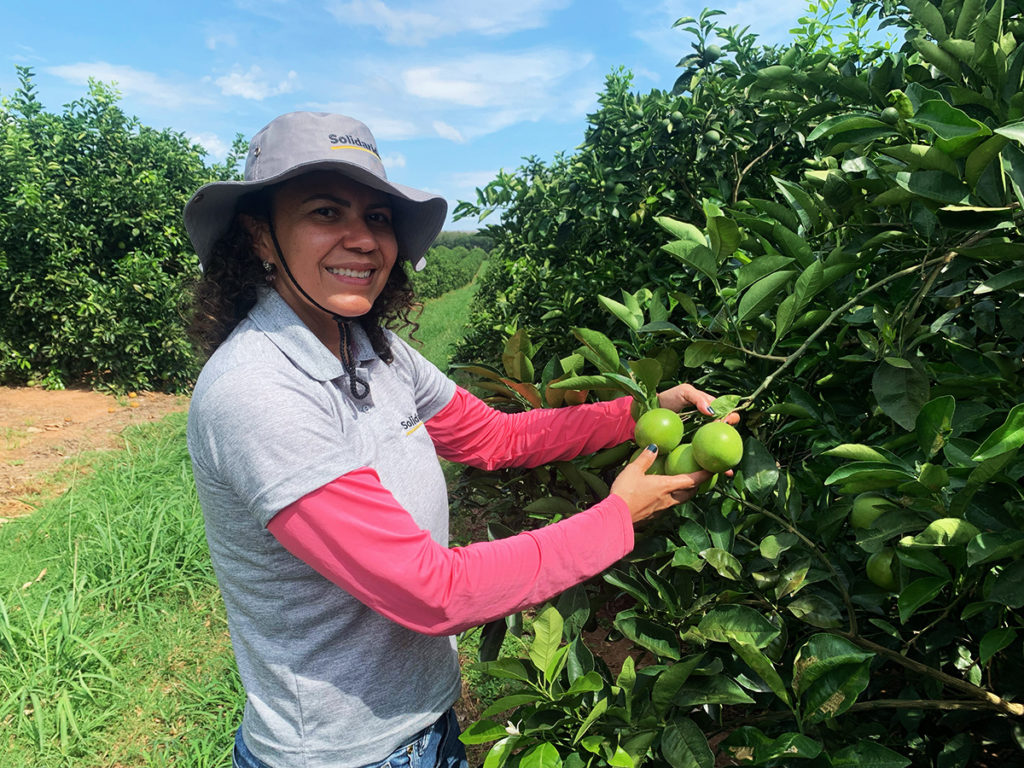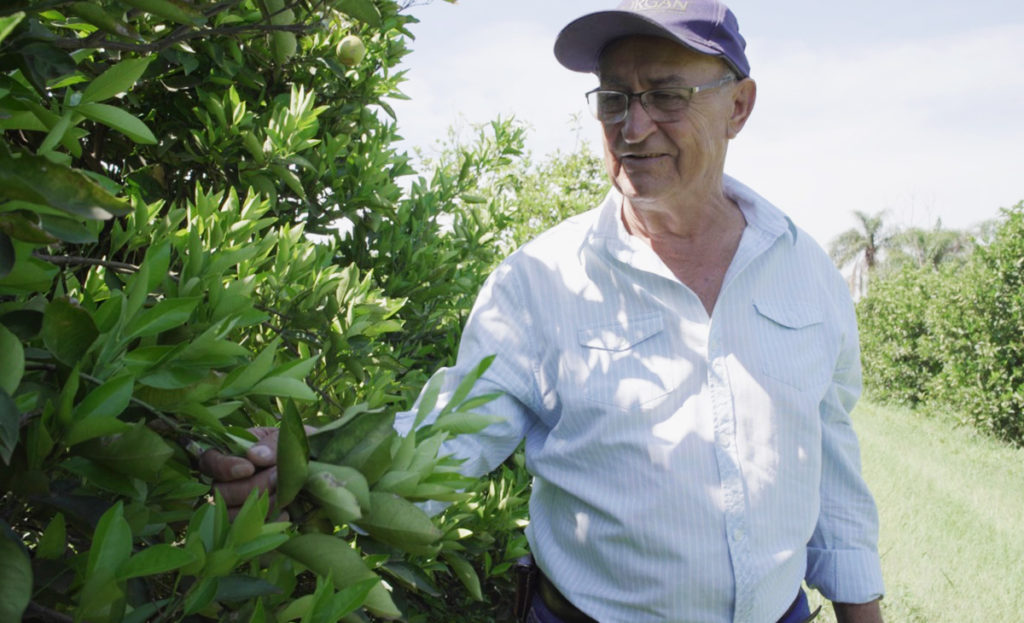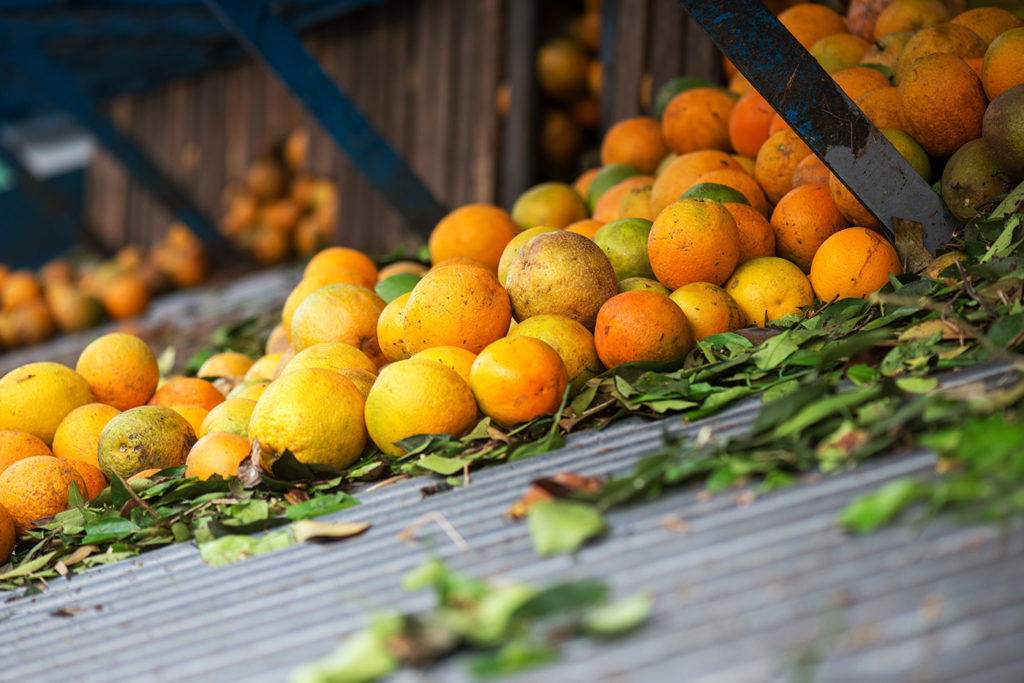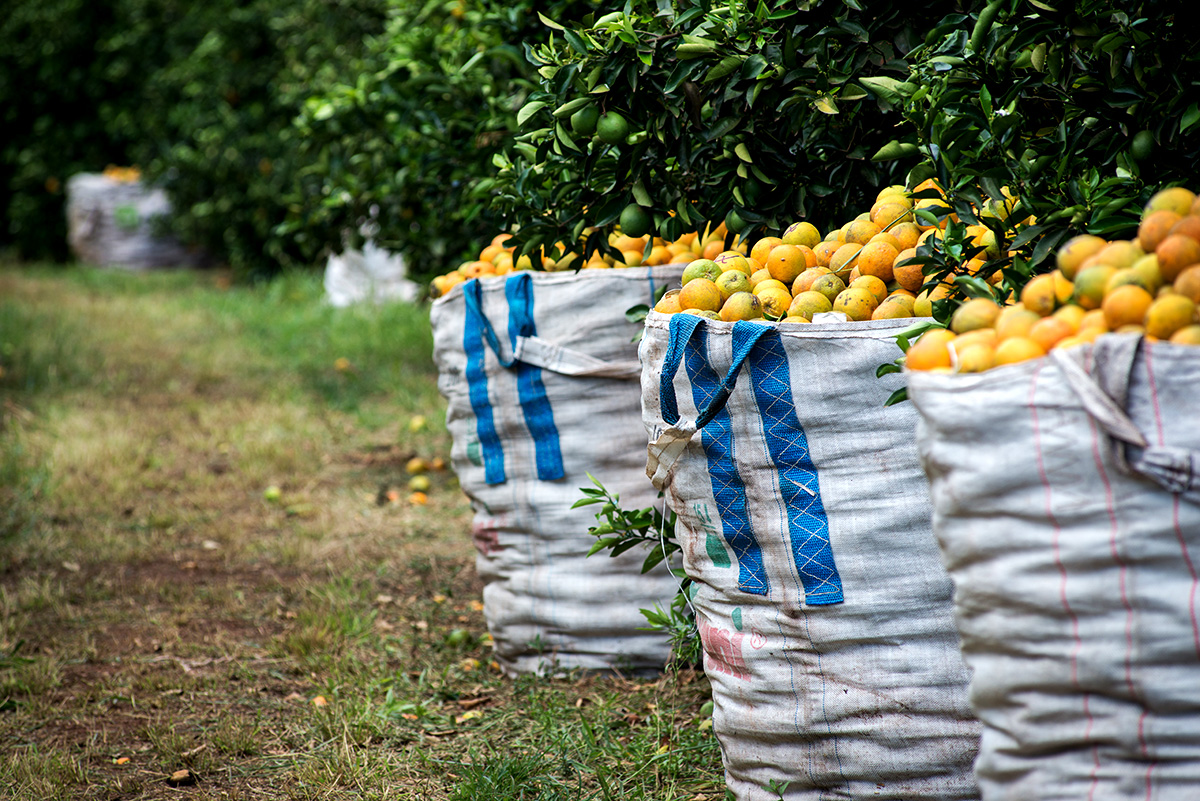Three out of every five glasses of orange juice are produced in Brazil; the world’s biggest fruit grower and largest exporter of juice. Given that Brazil exports 95% of its juice, the need to demonstrate adherence to global sustainability standards is important for about 6,000 orange growers in the country, posing an additional challenge for small farmers (up to 100 hectares).
In this context, Solidaridad launched an unprecedented pre-competitive initiative in Brazil, the project Fruto Resiliente: Strengthening sustainable orange production in 2019. The goal is to support small farmers in the Brazilian Citrus Belt, which lies within the states of São Paulo and Minas Gerais and accounts for 90% of national production.
The project aims to foster better agricultural practices combined with good management of rural properties of around 500 small farmers over four years. The actions are supported by the Brazilian orange juice processor Cutrale, The Coca-Cola Company, The Coca-Cola Foundation, Innocent Drinks, and Eckes-Granini. These organizations identified an opportunity to help small farmers to adapt to comply with law requirements, labor and environmental standards, and ensure competitiveness. In the first two and a half years, more than 130 farmers have been directly supported by the project. The goal is to reach a total of 200 citrus growers by the end of 2022.
It was through dialogue, coordinated strategies, and practical solutions in a pre-competitive context where everyone wins, that the Fruto Resiliente project emerged.
Rodrigo Castro, country manager of Solidaridad in Brazil
“Solidaridad is committed to increasing sustainability and social inclusion in the country’s main agricultural production chains. As in the case of oranges, we seek to establish collaborative and integrative strategic partnerships to promote a more prosperous citrus production in balance with nature. And it was through dialogue, coordinated strategies, and practical solutions in a pre-competitive context where everyone wins, that the Fruto Resiliente project emerged,” emphasized the country manager of Solidaridad in Brazil, Rodrigo Castro.
The project’s main objectives are to:
- support farms in adapting to Brazilian legislation
- achieve internationally recognized sustainability verification standards (based on Sustainable Agriculture Initiative’s Farm Sustainability Assessment (SAI/FSA) verification standards
- increase competitiveness and
- guarantee human rights for agricultural workers.

Solidaridad Project Coordinator Guilherme Ortega believes that strengthening the resilience of small farmers contributes to consolidating Brazilian citrus production. It allows them to improve their livelihoods and thrive as orange suppliers to the market.
We are giving small farmers access to information and the opportunity to achieve parameters and practices demanded by the market, but that can be challenging for smallholders.
Guilherme Ortega, Solidaridad project coordinator
“We are giving small farmers access to information and the opportunity to achieve parameters and practices demanded by the market, but that can be challenging for smallholders. The project provides access to individual technical assistance for small farmers, thus, we are able to help them achieve more efficient practices from a sustainability standpoint and in a more efficient way,” he said.
The project has already directly and indirectly impacted more than 800 farmers with training materials and almost 400 technical visits. Participants receive individualized technical assistance, combined with collective training on the various stages of orange production, from soil analysis to working conditions. Four extension workers and a field coordinator assist in almost 30 municipalities in both states (São Paulo and Minas Gerais) to ensure the actions are effective. Technical development work is another important element of the project’s success. Solidaridad contributes to the farmers’ training by carrying out activities with specialists in citrus.
Improving labor standards
Labor standards and legislation is one of the project’s central themes. Along this theme, we’ve facilitated activities related to health, safety, and formalization in hiring workers, as well as providing videos, booklets, and podcasts for guidance. In April 2022, 50 farmers who were assisted by the project’s extension workers, participated in training sessions about the main issues relating to hiring and working conditions. The training covered:
- minimum wage
- working hours
- workers’ rights
- adequate farm and accommodation structure for workers
- use of personal protective equipment and
- hiring and contracts with third-party companies.
Nearly 1,000 permanent and seasonal workers have already benefited, directly or indirectly, from the project’s activities and materials.

KEEPING UP WITH MARKET DEMANDS
“I receive frequent follow-up, and I am learning a lot. For example, I learned how to properly store and dispose of pesticides. I see the project as a space to bring together and strengthen small farmers, and I can only thank you,” said Mario da Silva, a farmer born into a family of citrus growers in the municipality of Leme in São Paulo. Faced with a falling number of small citrus farmers in recent decades, he believes that many lack the assistance to keep up with the market’s new demands, and that the Fruto Resiliente project’s support has helped. Mario was one of the first farmers to join the project.
Amid so many daily, climatic, and economic challenges, it’s often difficult to access information, be competitive, and not fall behind. In this sense, the technical assistance and lectures offered by the Fruto Resiliente project have been vital
Sebastião Seregatti, citrus grower and Fruto Resiliente participant
As a son of rural producers and having cultivated oranges for 35 years, Sebastião Seregatti believes that the main challenge small farmers face today is keeping up to date. “Amid so many daily, climatic, and economic challenges, it’s often difficult to access information, be competitive, and not fall behind. In this sense, the technical assistance and lectures offered by the Fruto Resiliente project have been vital,” he said.
SECTOR RECOGNITION
In addition to the companies that finance this pre-competitive initiative, other key players in the sector have recognized the Fruto Resiliente project by partnering, including farmers’ associations. Through this alliance, local organizations use Solidaridad’s digital tools to expand the number of farmers reached. The partnership with the Centro de Citricultura Sylvio Moreira (CCSM), a prominent research centre in Brazil, provides videos of the day-to-day practices at the CCSM Experimental Farm. The goal is to show how simple it can be to adjust activities on the farm to make them more sustainable. CCSM also promotes training and field days for project participants, allowing time for exchanges with researchers.

“We are organizing several events with priority themes for citrus production in the field. These meetings offer the opportunity for face-to-face discussions, to ask questions, analyze specific conditions, and talk about topics such as management and fertilization, pest control and irrigation strategies, as well as other practices crucial for growing quality fruits,” stated CCSM Director Dirceu Mattos Jr.
CONTENT PRODUCTION
The Fruto Resiliente project has been providing training material in different formats to help disseminate information in the citrus sector. It has already produced 15 animated videos, 11 YouTube training courses, and 22 podcasts that had experts answering questions from farmers. These materials have had almost 12,000 views so far and are available on Citros Conecta; a portal dedicated to news and information about citrus.
In addition, the initiative has produced seven booklets with information about different topics, and a field book in which farmers can keep a record of everyday rural-property life. The material offers a broader understanding of orange production topics with illustrations and accessible language. It gives tips on the best procedures in cultivation, property management, and relationships with employees and service providers. It’s a permanent contribution to the sector, expanding project participants’ knowledge, and supporting other orange growers around the country, who can freely access the information online.
Read more about our work in fruit and vegetables.

